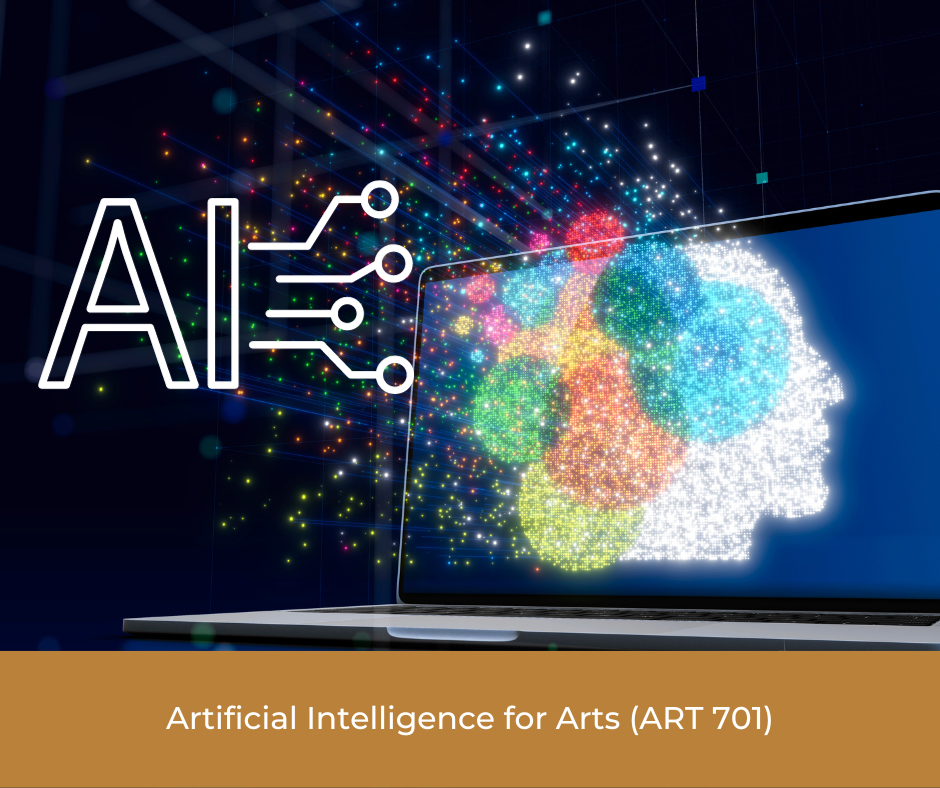“ART 701: Artificial Intelligence for Arts” is an interdisciplinary course that explores the intersection of artificial intelligence (AI) and the arts. This course is designed for students with an interest in leveraging AI technologies to create, analyze, and appreciate art across various forms, including visual arts, music, literature, and more. Through hands-on projects and critical discussions, students will explore how AI is transforming artistic expression and creativity.
Outline of Major Content Areas:
- Introduction to AI in the Arts:
- Overview of AI technologies and their application in various artistic disciplines.
- Historical context and notable examples of AI-generated art.
- AI-Generated Art and Music:
- Creating visual art using AI algorithms and generative models.
- Composing music with AI-powered tools and algorithms.
- Ethical considerations in AI-generated art and music.
- AI in Literature and Writing:
- Exploring AI-driven language models for creative writing.
- Collaborative storytelling with AI co-authors.
- Analyzing AI-generated literature and its impact on traditional writing.
- AI and Artistic Collaboration:
- Collaborative projects between artists and AI systems.
- Art generated through human-AI partnerships.
- Critically evaluating AI’s role in artistic collaboration.
- AI and Art Critique:
- Analyzing AI-generated art and its place in the art world.
- Ethical and philosophical discussions on AI as an artist.
- Artistic expression and human-AI interactions.
- Future Trends and Ethical Considerations:
- Emerging AI technologies in the arts.
- Ethical implications of AI in artistic creation and appreciation.
- Guest lectures and discussions with AI artists and experts.
Course Learning Outcomes:
Upon completing ART 701, students will:
- AI Integration: Understand how AI technologies can be integrated into various artistic disciplines, including visual arts, music, and literature.
- Creative Application: Apply AI techniques to create original art, music, or literature that pushes the boundaries of traditional artistic expression.
- Critique and Analysis: Analyze AI-generated art and literature critically, considering its aesthetic, philosophical, and ethical dimensions.
- Collaborative Skills: Collaborate effectively with AI systems to co-create artistic works and appreciate the synergy between human and machine creativity.
- Ethical Awareness: Recognize and address ethical considerations related to the use of AI in artistic creation and appreciation.
- Future-Ready: Stay informed about emerging AI technologies and trends in the intersection of AI and the arts.
Methods for Assessing Student Learning:
Assessment in ART 701 is designed to evaluate students’ understanding and practical application of AI in the arts:
- Class Participation: Active engagement in discussions and activities related to AI in the arts.
- AI-Enhanced Art Project: Students will work on an artistic project that incorporates AI technologies, such as AI-generated art, music compositions, or collaborative writing. The project will be assessed based on creativity and technical proficiency.
- Critical Analysis: Research papers or presentations on specific AI applications in the arts, addressing both creative and ethical aspects.
- Examinations: Periodic examinations or quizzes to assess understanding of AI concepts and their relevance to the arts.
- Final Presentation: A final presentation of the AI-enhanced artistic project, demonstrating the integration of AI technologies and the creative outcomes.
ART 701 empowers students to explore the transformative potential of AI in the arts while fostering critical thinking about the evolving relationship between technology and creativity. It equips them to engage meaningfully with AI as a tool for artistic expression and to contribute to the evolving discourse surrounding AI-generated art and its implications.
